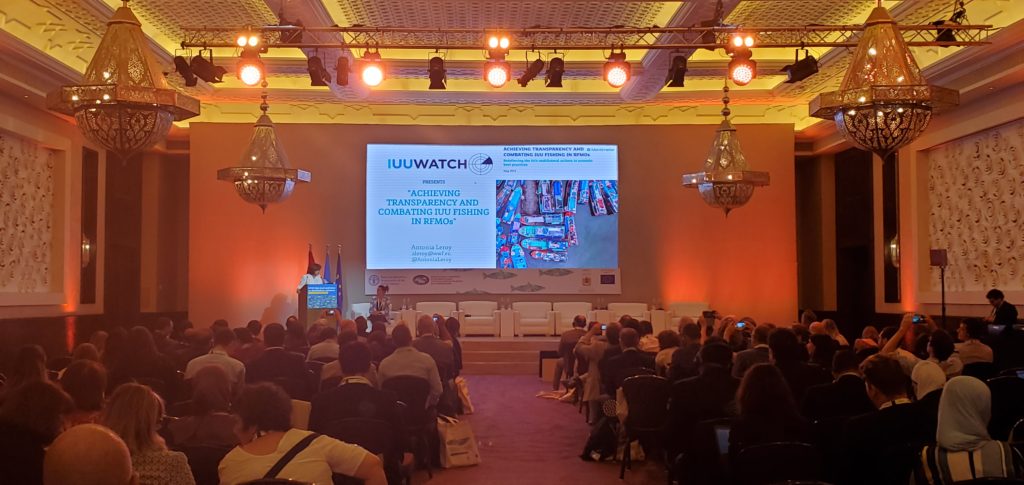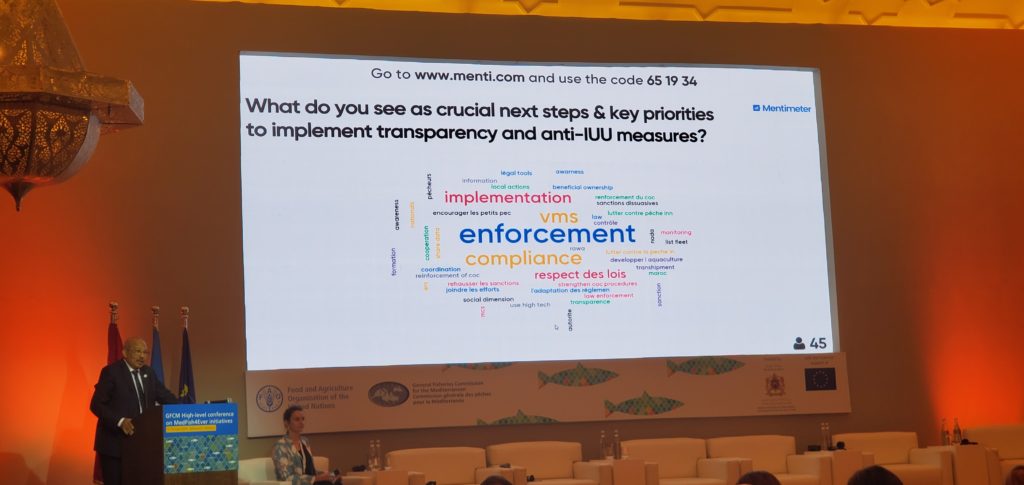Reinforcing the EU’s multilateral actions to promote best practices
On Wednesday, 5 June, on the International Day Against IUU Fishing the Environmental Justice Foundation (EJF), Oceana, The Nature Conservancy, The Pew Charitable Trusts and WWF – the EU IUU Coalition, launch a report outlining the minimum transparency and anti-IUU fishing measures deemed vital for Regional Fisheries Management Organisations (RFMOs), the international and transnational bodies who manage fisheries activities for many of the world’s most valuable fish stocks, to adopt and implement. These recommendations span from the point of harvest (where identification and tracking of vessels activities are needed), through the landing, transportation and trade of fish products, including traceability systems along the value chain.
The report was officially launched at an event organised by the EU IUU Coalition in Brussels, with representatives from EU Member States, the European Commission, European Parliament, the fisheries industry and NGO community. It was also presented at General Fisheries Commission for the Mediterranean (GFCM)’s MedFish4Ever high-level event on 11 June in Marrakech, as part of the International Day Against IUU Fishing celebrations and in the presence of senior fisheries management officials from GFCM’s member states and other stakeholders.

With the environmental and economic viability of global fisheries in crisis, illegal, unreported and unregulated (IUU) fishing remains one of the biggest threats to the sustainable management of marine resources. IUU fishing adds pressure to already overexploited fish stocks, while simultaneously compromising efforts to rebuild them; it distorts global fish markets and prices, leaving legal fishermen disadvantaged; and it often occurs alongside other crimes such as human rights abuses, drugs and weapons trafficking, tax fraud and corruption.
It is estimated that up to one in five wild caught fish is fished illegally, the product of an illicit global business worth billions each year, corresponding to at least 15% of the world’s catches. As a major global fishing power and the world’s largest trader of fishery and aquaculture products in terms of value in 2016, its active and influential role as a member of 16 RFMOs worldwide, and in light of the significant commitments it has made to improve international ocean governance, the EU is called upon to continue using its unique and critical position to drive policy changes and prompt actions by other markets to fight IUU fishing.
The EU IUU Coalition calls on the EU to:
- Continue leading on promoting transparent fisheries governance at a global level;
- Build alliances with the contracting parties and cooperating non contracting parties (CPCs) of RFMOs, in intensifying efforts to effectively implement measures for tackling IUU fishing practices; and
- Establish (when not in place) and enforce RFMO measures that would trigger action against CPCs in cases of non-compliance.

It became clear at both presentations, that in addition to the need for strong measures to be adopted, implementation is key. Enforcing the rules and holding those with bad practices accountable (such as via sanctioning systems) are essential. The EU IUU Coalition will use this new report to support its ongoing work and dialogues with decision-makers to deliver transparent, traceable, safe and sustainable global fisheries.
The EU IUU Coalition’s full list of essential measures to increase transparency and tackle IUU fishing in RFMOs:
Identification and tracking of vessel activities: point of harvest
- Public disclosure of vessel registries and fishing authorisations
- Mandate IMO numbers as unique vessel identifiers on all motorised fishing vessels above 12 metres
- Align all RFMOs with leading global standards in Vessel Monitoring Systems (VMS)
- Develop joint inspection schemes at sea
Landing and transport of fish products:
- Implement effective port State measures (PSMs)
- Monitor and report 100% of transhipment activities or introduce a complete ban at sea
Traceability along the value chain: the trade of fish products:
- Avoidance of total allowable catch overshoot with a Catch Documentation Scheme (CDS)
Deterrent sanctions and IUU vessel lists:
- Effectively stop vessels and nationals engaged in IUU fishing
- Automatic recognition and cross-listing of IUU vessels
Transparent procedures:
- Strengthen the fundamental decision-making process with a transparent objection procedure
- Strengthen compliance with conservation and management measures
- Open data policies and stakeholder inclusivity
To read the full report in English (updated in 2020), please click here.
To read the full report in French (updated in 2020), please click here.
EU IUU coalition statements:
Max Schmid, Deputy Director of EJF:
“The EU is leading the world with its measures to combat IUU fishing and stop illegal product entering the common market. Now is the time to use that same positive influence to help RFMOs eradicate IUU fishing through effectively implemented and enforced measures. A key aspect of this will be promoting transparency in fisheries, which can be achieved using simple, low-cost measures that are within reach of all regions.”
María José Cornax, senior policy and advocacy director of Oceana:
“RFMO performance is currently in the spotlight at international level. In this critical moment, and under the efforts to achieve Sustainable Development Goal 14, RFMOs should undergo improvements to effectively lead the path towards sustainable fisheries and to fight IUU fishing. Transparency should be the guiding principle along the way for RFMOs and their contracting Parties on the high seas and in their waters.”
Marta Marrero Martin, Ocean Governance Director, TNC:
“RFMOs have an opportunity and a duty to sustainably manage fish stocks and stop illegal, unreported and unregulated fishing in their convention areas. This report outlines essential measures, many of which are not currently adopted by RFMOs. From improving traceability along the value chain (through robust catch documentation schemes) to strengthening the identification and tracking of vessel activities. RFMOs need to set these standards to ensure that they enhance and support global seafood governance. TNC are committed to continue supporting this effort.”
Peter Horn, project director, international fisheries of Pew:
“This report highlights how regional fisheries management organisations can more effectively manage their waters and thereby protect our ocean and the livelihoods that depend on it. These organisations are critical to the governance and health of the ocean, but their members often fail to adopt or implement management measures that are needed to conserve its resources. As the world’s largest seafood trader, the European Union can help change that and, by working with others, lead the charge for sustainable fish stocks and safeguards against illegal fishing practices.”
Dr Samantha Burgess, Head of Marine Policy at WWF European Policy Office:
“With 33% of global fish stocks overfished and demand for seafood continuing to rise, the EU’s influence in the regional management bodies (RFMOs) is more important than ever to push for the adoption of innovative and transparent decision-making procedures, together with compliance mechanisms which are open to external scrutiny. Measures to combat IUU fishing are only as good as their implementation. Only by knowing where capacity or political will is lacking can we support or expose countries to better tackle IUU fishing and secure a sustainable future for our fisheries.”
The Environmental Justice Foundation (EJF), Oceana, The Nature Conservancy, The Pew Charitable Trusts and WWF are working together to promote EU leadership in improving global fisheries transparency and governance to end illegal, unreported and unregulated (IUU) fishing
